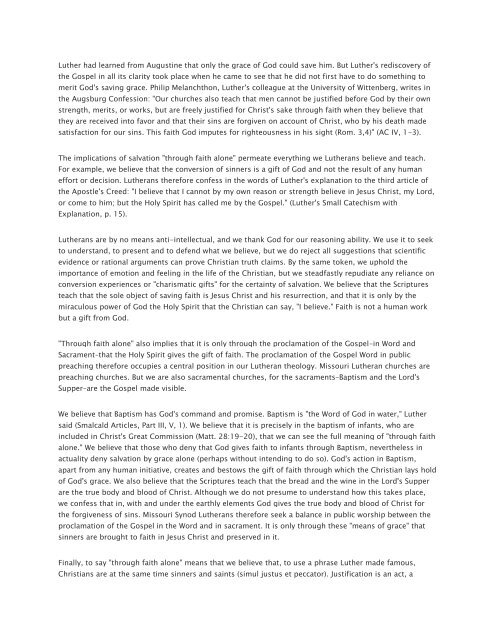What do Lutherans believe? - The Lutheran Church—Missouri Synod
What do Lutherans believe? - The Lutheran Church—Missouri Synod
What do Lutherans believe? - The Lutheran Church—Missouri Synod
You also want an ePaper? Increase the reach of your titles
YUMPU automatically turns print PDFs into web optimized ePapers that Google loves.
Luther had learned from Augustine that only the grace of God could save him. But Luther's rediscovery of<br />
the Gospel in all its clarity took place when he came to see that he did not first have to <strong>do</strong> something to<br />
merit God's saving grace. Philip Melanchthon, Luther's colleague at the University of Wittenberg, writes in<br />
the Augsburg Confession: "Our churches also teach that men cannot be justified before God by their own<br />
strength, merits, or works, but are freely justified for Christ's sake through faith when they <strong>believe</strong> that<br />
they are received into favor and that their sins are forgiven on account of Christ, who by his death made<br />
satisfaction for our sins. This faith God imputes for righteousness in his sight (Rom. 3,4)" (AC IV, 1-3).<br />
<strong>The</strong> implications of salvation "through faith alone" permeate everything we <strong><strong>Lutheran</strong>s</strong> <strong>believe</strong> and teach.<br />
For example, we <strong>believe</strong> that the conversion of sinners is a gift of God and not the result of any human<br />
effort or decision. <strong><strong>Lutheran</strong>s</strong> therefore confess in the words of Luther's explanation to the third article of<br />
the Apostle's Creed: "I <strong>believe</strong> that I cannot by my own reason or strength <strong>believe</strong> in Jesus Christ, my Lord,<br />
or come to him; but the Holy Spirit has called me by the Gospel." (Luther's Small Catechism with<br />
Explanation, p. 15).<br />
<strong><strong>Lutheran</strong>s</strong> are by no means anti-intellectual, and we thank God for our reasoning ability. We use it to seek<br />
to understand, to present and to defend what we <strong>believe</strong>, but we <strong>do</strong> reject all suggestions that scientific<br />
evidence or rational arguments can prove Christian truth claims. By the same token, we uphold the<br />
importance of emotion and feeling in the life of the Christian, but we steadfastly repudiate any reliance on<br />
conversion experiences or "charismatic gifts" for the certainty of salvation. We <strong>believe</strong> that the Scriptures<br />
teach that the sole object of saving faith is Jesus Christ and his resurrection, and that it is only by the<br />
miraculous power of God the Holy Spirit that the Christian can say, "I <strong>believe</strong>." Faith is not a human work<br />
but a gift from God.<br />
"Through faith alone" also implies that it is only through the proclamation of the Gospel–in Word and<br />
Sacrament–that the Holy Spirit gives the gift of faith. <strong>The</strong> proclamation of the Gospel Word in public<br />
preaching therefore occupies a central position in our <strong>Lutheran</strong> theology. Missouri <strong>Lutheran</strong> churches are<br />
preaching churches. But we are also sacramental churches, for the sacraments–Baptism and the Lord's<br />
Supper–are the Gospel made visible.<br />
We <strong>believe</strong> that Baptism has God's command and promise. Baptism is "the Word of God in water," Luther<br />
said (Smalcald Articles, Part III, V, 1). We <strong>believe</strong> that it is precisely in the baptism of infants, who are<br />
included in Christ's Great Commission (Matt. 28:19-20), that we can see the full meaning of "through faith<br />
alone." We <strong>believe</strong> that those who deny that God gives faith to infants through Baptism, nevertheless in<br />
actuality deny salvation by grace alone (perhaps without intending to <strong>do</strong> so). God's action in Baptism,<br />
apart from any human initiative, creates and bestows the gift of faith through which the Christian lays hold<br />
of God's grace. We also <strong>believe</strong> that the Scriptures teach that the bread and the wine in the Lord's Supper<br />
are the true body and blood of Christ. Although we <strong>do</strong> not presume to understand how this takes place,<br />
we confess that in, with and under the earthly elements God gives the true body and blood of Christ for<br />
the forgiveness of sins. Missouri <strong>Synod</strong> <strong><strong>Lutheran</strong>s</strong> therefore seek a balance in public worship between the<br />
proclamation of the Gospel in the Word and in sacrament. It is only through these "means of grace" that<br />
sinners are brought to faith in Jesus Christ and preserved in it.<br />
Finally, to say "through faith alone" means that we <strong>believe</strong> that, to use a phrase Luther made famous,<br />
Christians are at the same time sinners and saints (simul justus et peccator). Justification is an act, a


